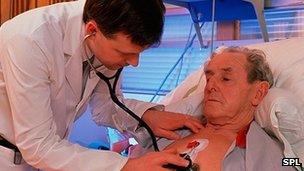NHS told to do more to 'reduce health inequalities'
- Published

The report encourages health professionals and organisations to act as advocates for patients
Health Secretary Jeremy Hunt has backed a report calling on health professionals to tackle the social and economic causes of ill health - not just the medical.
The report, supported by the British Medical Association, says more needs to be done to reduce the health divide between rich and poor.
It contains a commitment to making "social referrals".
The Health Secretary said the NHS had a legal duty to reduce health inequality.
It has been calculated that addressing health inequalities in the way the report suggests could save the NHS £5.5bn a year.
The report from the Institute of Health Equity, external points out that eight people a second are seen by the NHS, yet not enough attention is given to social and economic problems underlying poor health.
It highlights examples of best practice including social referral schemes to employment and housing advice, training on nutrition for childcare providers and helping elderly patients to build social networks after a stay in hospital.
The report is led by Professor Sir Michael Marmot who highlighted in 2010 that inequality costs the UK £31-33bn per year in productivity and lost taxes, and £20-32bn in welfare payments - in addition to the added costs to the NHS.
Its recommendations include:
•Better education and training on social causes of ill-health and opening up healthcare careers to people from all backgrounds
•Recording social history alongside medical information and offering referral to range of medical, social services and other agencies
•Ensuring NHS staff are paid a minimum income for healthy living
•Using joint commissioning, data-sharing and shared schemes to tackle health inequalities
•Encouraging health professionals, students and healthcare organisations to act as advocates for patients, their families and local communities to improve social and economic conditions
Wealth gap
Sir Michael said despite having the most equitable health service in the world, inequalities in social and living conditions are driving inequalities in health.
"Even among health professionals who have this insight, there has been a sense that it is for others to respond, there is not much we can do.
"But the response we have had from the many organisations and individuals that have helped us with this report is not only should we be taking action but there is ample evidence that we can."
The gap in life expectancy across England between the best and worst-off is seven years but in some areas such as London, this rises to 17 and in Glasgow there is a 28-year difference in life expectancy between rich and poor.
From April, local authorities in England will take over responsibility for the prevention of ill health but this report is solely aimed at those working in the health service.
Dr Vivienne Nathanson, from the British Medical Association said many of their members are already using their position as doctors not just to focus on disease but also the wider social issues that contribute to their patients' ill-health.
"We need to spread the word about good practice so that doctors can learn from their colleagues who are successfully providing an integrated approach to healthcare, for example, by referring patients to employment, debt or benefits advice centres when these factors go hand in hand with their health problems."
Health Secretary Jeremy Hunt said: "Everyone should have the same opportunity to lead a healthy life; no matter where they live or who they are which is why we must continue to work to narrow the gap in health inequalities.
"We have set out the first ever specific legal duties on health inequalities for the NHS and I recently set out my challenge on reducing premature mortality.
He added: "Local areas must work together to address the health needs of their population and make a real difference in tackling health inequalities."
- Published19 December 2012
- Published13 November 2012
- Published5 November 2012